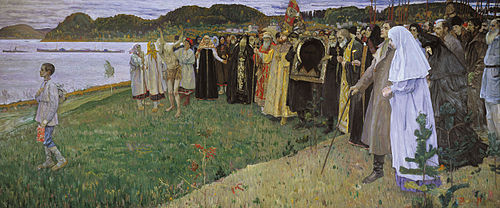Sobornost
The term expresses the need for co-operation between people at the expense of individualism, on the basis that opposing groups focus on what is common between them.
Khomyakov's concept of the "catholicity" of the Christian Church as "universality", in contrast to that of Rome, reflects the perspective from the root-meaning of the word "liturgy" (Greek: λειτουργία), meaning "work of the gathered people".
[3] Vladimir Solovyov (1853–1900) developed the idea of vseedinstvo, unity-of-all, a concept similar to that of sobornost and closely connected with his doctrine of Godmanhood.
Solovyov characterized the essence of the approach in this way: "Recognizing the final goal of history as the full realization of the Christian ideal in life by all humanity... we understand the all-sided development of culture as a general and necessary means for reaching that goal, for this culture in its gradual progress destroys all those hostile partitions and exclusive isolations between various parts of humanity and the world and tries to unify all natural and social groups in a family that is infinitely diverse in make-up but characterized by moral solidarity".
In Trubetskoy's interpretation, sobornost means a combination of the religious, moral and social element, as an alternative to individualism and socialist collectivism.
In one of his major works, On the Nature of Human Consciousness, Trubetskoy wrote, "Good will, which is the basis of morality, is called love.
[5] Kireyevsky asserted that "the sum total of all Christians of all ages, past and present, comprise one indivisible, eternal living assembly of the faithful, held together just as much by the unity of consciousness as through the communion of prayer".
Sergei Bulgakov, Nikolai Berdyaev and Pavel Florensky were notable proponents for the spirit of sobornost between different Christian factions.
